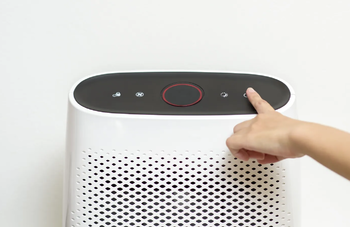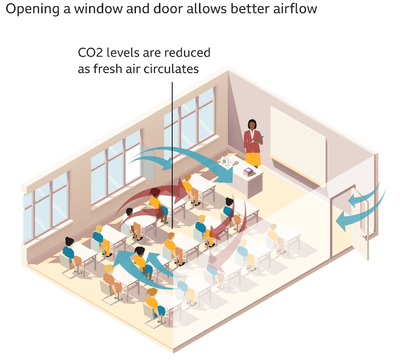Difference between revisions of "Anti-Covid air technology"
(Grignard Pure) |
|||
| Line 27: | Line 27: | ||
==Asthma== | ==Asthma== | ||
The [[American College of Allergy, Asthma & Immunology]] has warned: “In people with [[asthma]] and airways hyper-reactivity, the irritant effect of short-term exposure to water-based fog machines — particularly when the chemical glycol is used — could trigger acute asthma symptoms including cough, wheeze, chest tightness and shortness of breath. Even in a person without asthma, short term exposure to glycol-containing fog machines can be associated with headaches, dizziness, drowsiness, and eye irritation. Prolonged exposure to this substance in a person with asthma could trigger even more severe respiratory difficulty and could cause bronchitic symptoms even in those without asthma."<ref>https://acaai.org/resources/connect/ask-allergist/fog-machines-and-asthma</ref> | The [[American College of Allergy, Asthma & Immunology]] has warned: “In people with [[asthma]] and airways hyper-reactivity, the irritant effect of short-term exposure to water-based fog machines — particularly when the chemical glycol is used — could trigger acute asthma symptoms including cough, wheeze, chest tightness and shortness of breath. Even in a person without asthma, short term exposure to glycol-containing fog machines can be associated with headaches, dizziness, drowsiness, and eye irritation. Prolonged exposure to this substance in a person with asthma could trigger even more severe respiratory difficulty and could cause bronchitic symptoms even in those without asthma."<ref>https://acaai.org/resources/connect/ask-allergist/fog-machines-and-asthma</ref> | ||
| + | |||
| + | ==Schools== | ||
| + | [[image:Classroom ventilation.png|thumbnail|left|400px|Anti-Covid measures in a classroom setting.<ref>https://www.bbc.co.uk/news/education-51643556/</ref>]] | ||
| + | In [[British]] [[schools]], it has become a key concern of the government. It is also being used as an excuse to digitise learning.<ref>https://www.bbc.co.uk/news/uk-northern-ireland-58559950</ref> | ||
{{SMWDocs}} | {{SMWDocs}} | ||
| + | |||
==References== | ==References== | ||
{{reflist}} | {{reflist}} | ||
Latest revision as of 13:45, 25 October 2021
(Technology, “COVID-19/Response”, Fraud?) | |
|---|---|
 An air purifier. | |
| Interest of | Indrek Neivelt |
| A genuine response to COVID, or just a cash grab? | |
In 2020, the phrase Anti-Covid air technology became used regularly in corporate media. "Experts" encouraged people to buy air purifiers to protect themselves from COVID.[1]
Timeline
In September 2020, CNBC reported on an air purifier from Hong Kong that allegedly killed 99.9% of coronavirus.[2]
In August 2021, a FDA approved "anti-Covid Class 2 medical device for SARS-COV-2 disinfection", was launched for consumption in India.[3]
On 30 August 2021, the Welsh Government announced £6 million pounds to be spent on an "air technology fund" to stop Covid spreading in schools, colleges and universities.[4]
Grignard Pure
In January 2021, the U.S. Environmental Protection Agency (EPA) approved requests[5] for an emergency exemption that would allow aerosolization of selected indoor spaces with an antiviral “air treatment” called Grignard Pure. Grignard Pure is a nanoparticle-based product with an active ingredient called triethylene glycol (TEG).[6]
The permits allow the states of Georgia and Tennessee to diffuse Grignard Pure continuously in “breakrooms, locker rooms, bathrooms, lobbies, elevators, eating areas and food preparation areas” in government, health care and food processing facilities as well as intrastate transportation — anywhere “where people are conducting activity deemed essential by the state.”[5]
The EPA endorsed the product’s emergency use in food preparation and eating areas despite warnings in the triethylene glycol safety data sheet not to store TEG “near food, foodstuffs or potable water supplies.”[7] Repeated exposures to a TEG aerosol "may result in respiratory tract irritation, with cough, shortness of breath and tightness of the chest.”[8]
As the Defender pointed out, "In an example of the revolving regulator-industry door, a four-decade veteran of EPA pesticide regulation is now a leading consultant for Grignard, helping the company market the anti-COVID fluid as the solution to a “critical challenge.”"[9]
Asthma
The American College of Allergy, Asthma & Immunology has warned: “In people with asthma and airways hyper-reactivity, the irritant effect of short-term exposure to water-based fog machines — particularly when the chemical glycol is used — could trigger acute asthma symptoms including cough, wheeze, chest tightness and shortness of breath. Even in a person without asthma, short term exposure to glycol-containing fog machines can be associated with headaches, dizziness, drowsiness, and eye irritation. Prolonged exposure to this substance in a person with asthma could trigger even more severe respiratory difficulty and could cause bronchitic symptoms even in those without asthma."[10]
Schools

In British schools, it has become a key concern of the government. It is also being used as an excuse to digitise learning.[12]
References
- ↑ https://eu.usatoday.com/story/tech/reviewedcom/2020/11/12/can-air-purifier-help-protect-you-covid-19/6262269002/
- ↑ https://www.cnbc.com/2020/09/08/coronavirus-air-purifier-that-kills-over-99point9percent-of-covid-19-sees-surge-in-demand.html
- ↑ https://www.biospectrumindia.com/news/43/19336/aurabeat-unveils-patented-ag-anti-covid-air-purifier-in-india.html
- ↑ https://www.bbc.co.uk/news/uk-wales-58382889
- ↑ Jump up to: a b https://www.epa.gov/newsreleases/epa-approves-emergency-exemption-antiviral-air-treatment
- ↑ https://www.thelastamericanvagabond.com/epa-quietly-approves-chemical-air-treatment-fight-covid-19-us-vaccine-passports-are-here/
- ↑ https://pubmed.ncbi.nlm.nih.gov/10462779/
- ↑ https://pubmed.ncbi.nlm.nih.gov/17299811/
- ↑ https://childrenshealthdefense.org/defender/epa-approves-chemical-air-treatment-covid-health-hazards/
- ↑ https://acaai.org/resources/connect/ask-allergist/fog-machines-and-asthma
- ↑ https://www.bbc.co.uk/news/education-51643556/
- ↑ https://www.bbc.co.uk/news/uk-northern-ireland-58559950